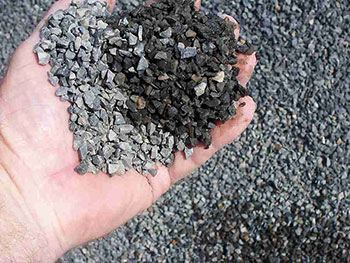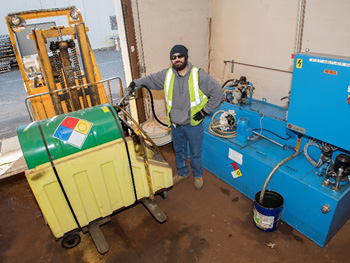Pollution Prevention and Waste Minimization
Our Pollution Prevention program is an essential element of our mission and represents our commitment to keeping waste reduction an integral part of the Laboratory's approach to its work.
The goal of our award-winning Pollution Prevention program is to integrate pollution prevention and waste minimization, resource conservation, recycling, and affirmative procurement into all aspects of our planning and decision-making processes. The program applies to all Laboratory employees, contractors, visitors, and guests.
Pollution prevention activities, recycling programs, and conservation initiatives have significantly reduced our waste volume and management costs. In 2019, these efforts resulted in over three million in savings and approximately three million pounds of materials being reduced, reused, or recycled.
An innovative example of how the Lab recycles is demonstrated by the Fabrication Services Division. The organization created the capability of recycling all cutting fluid used in-house, while investing in engineering improvements to its machinery at the same time to greatly improve efficiency.
The improvements resulted in the reduction of overall volume of the cutting fluid used. The organization recycled and reused a total of 1,565 gallons of cutting fluid in FY19.
Through our solid waste recycling program, 60 tons of office paper were collected during 2019. Cardboard, bottles and cans, motor oil, scrap metals and electronics, lead, automotive tires and batteries, fluorescent light bulbs, toner cartridges, concrete and blasting garnet were also recycled.
Concrete and stone/brick demolition debris is stored on-site to be converted into recycled concrete aggregate that the Lab uses on firebreaks, or, as an underlayment for parking areas.

Concrete aggregate (Photo: Bill Bradley)

Cutting fluid recycling in action!
Use of recycled concrete aggregate material helped us achieve LEED certification for four of the Laboratory's newest buildings
Tracking Waste Reduction
The Lab arranges for removal of hazardous waste materials using procedures that help prevent spills, discharge into wastewater and evaporation into the atmosphere. Our waste handling program is designed to protect human health and the environment by reducing the potential for accidents and improper disposal. We limit the use of hazardous materials by choosing non-hazardous substitutes whenever possible.
Pollution Prevention/Waste Minimization Awards
These awards, based on rigorous assessment of our performance by external government, public, and private organizations, are one way that Brookhaven Lab measures success in the pursuit of sustainable operations.
- Green Electronics Council EPEAT Purchaser Award for “Excellence in procurement of sustainable electronics” and for “IT Products” (2018)
- U.S. Department of Energy GreenBuy Award for sustainable acquisition practices (2018)
- U.S. Environmental Protection Agency (EPA) Federal Green Challenge Regional Award for “Waste Diversion” and “Electronic Reuse/Recycling” (2018)
- Green Electronics Council EPEAT Purchaser Award for “Excellence in procurement of sustainable electronics” (2017)
- U.S. Department of Energy Gold GreenBuy Award for sustainable acquisition practices (2017)
- U.S. Environmental Protection Agency (EPA) Federal Green Challenge Award for “Leadership” (2016)
- U.S. Department of Energy Sustainability Award for the Utility Energy Services Contract (2016)
- U.S. EPA Federal Green Challenge Award for “Transportation” (2015)
- U.S. EPA Federal Green Challenge National Award for “Revamping the e-pro system to increase choice of sustainable office products” (2014)
- U.S. EPA Federal Green Challenge Regional Award for “Improvements in waste, transportation” (2014)
- U.S. EPA Federal Green Challenge Regional Award for “Improvements in Purchasing” (2013)
- U.S. Department of Energy Silver GreenBuy Award for sustainable acquisition practices (2012)
- U.S. EPA Federal Green Challenge Award – Silver (2012)
- U.S. EPA Federal Green Challenge Award – Bronze (2011)
- U.S. EPA National Partnership for Environmental Priorities Award for “Commitment to reduce priority chemicals through the National Partnership for Environmental Priorities” (2010)
- U.S. EPA National Partnership for Environmental Priorities Award for “Total nitrogen reduction at Brookhaven’s Sewage Treatment Plant using cafeteria wastes” (2009)
- Office of the Federal Environmental Executive Silver GreenGov Award for “Electronics recycling” (2009)
- U.S. Department of Energy ESTAR Environmental Sustainability Award for "Total nitrogen reduction at Brookhaven’s Sewage Treatment Plant" (2009)



